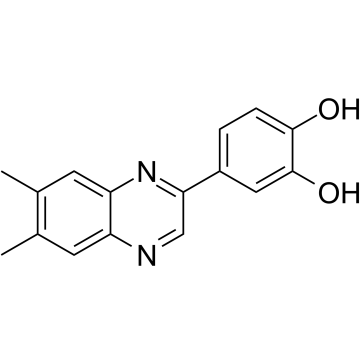Tyrphostin AG1433
Modify Date: 2024-01-07 20:50:35

Tyrphostin AG1433 structure
|
Common Name | Tyrphostin AG1433 | ||
|---|---|---|---|---|
| CAS Number | 168835-90-3 | Molecular Weight | 266.29 | |
| Density | N/A | Boiling Point | N/A | |
| Molecular Formula | C16H14N2O2 | Melting Point | N/A | |
| MSDS | N/A | Flash Point | N/A | |
Use of Tyrphostin AG1433Tyrphostin AG1433 (SU1433) is a tyrosine kinases inhibitor. AG1433 is also a selective PDGFRβ and VEGFR-2 (Flk-1/KDR) inhibitor with IC50s of 5.0 μM and 9.3 μM, respectively. Tyrphostin AG1433 prevents blood vessel formation[1][2][3][4]. |
| Name | Tyrphostin AG1433 |
|---|---|
| Synonym | More Synonyms |
| Description | Tyrphostin AG1433 (SU1433) is a tyrosine kinases inhibitor. AG1433 is also a selective PDGFRβ and VEGFR-2 (Flk-1/KDR) inhibitor with IC50s of 5.0 μM and 9.3 μM, respectively. Tyrphostin AG1433 prevents blood vessel formation[1][2][3][4]. |
|---|---|
| Related Catalog | |
| Target |
Flk-1:9.3 μM (IC50) PDGFRβ:5 μM (IC50) |
| In Vitro | Tyrphostin AG1433 (0.1-100 μM; 72 hours; GB8B cells) treatment induces moderate cytotoxicity in glioblastoma cells[1]. Cell Viability Assay[1] Cell Line: GB8B cells Concentration: 0.1 μM, 1 μM, 5 μM, 10 μM, 20 μM, 30 μM, 50 μM, 60 μM, 100 μM Incubation Time: 72 hours Result: Induced significant cell death in GB8B cells in a concentration-dependent manner. |
| In Vivo | Chorion allantoic membrane (CAM) assays are used to determine the effects of the Flk-i inhibitors on angiogenesis. Tyrphostin AG1433 (SU1433) is prepared in methylcellulose pellets and applies to the CAMs of 4-6-day-old chicken embryos. Tyrphostin AG1433 prevents the formation of new yessels under the pellets[2]. |
| References |
| Molecular Formula | C16H14N2O2 |
|---|---|
| Molecular Weight | 266.29 |
| MFCD03426524 |